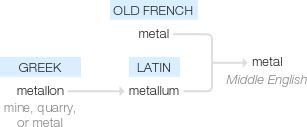Metal
Middle English: from Old French metal or Latin metallum, from Greek metallon ‘mine, quarry, or metal’.
wiktionary
From Middle English metal, a borrowing from Old French metal, from Latin metallum(“metal, mine, quarry, mineral”), itself a borrowing from Ancient Greek μέταλλον(métallon, “mine, quarry, metal”).
etymonline
metal (n.)
an undecomposable elementary substance having certain recognizable qualities (opacity, conductivity, plasticity, high specific gravity, etc.), mid-13c., from Old French metal "metal; material, substance, stuff" (12c.), from Latin metallum "metal, mineral; mine, quarry," from Greek metallon "metal, ore" (senses found only in post-classical texts, via the notion of "what is got by mining"); originally "mine, quarry-pit," probably a back-formation from metalleuein "to mine, to quarry," a word of unknown origin. Perhaps related somehow to metallan "to seek after," but Beekes finds this "hardly convincing."
The concept was based on the metals known from antiquity: gold, silver, copper, iron, lead, and tin. As an adjective, "of or covered with metal," from late 14c. As short for heavy metal (rock music) by 1980. Metal-work "work, especially artistic work, in metal" is by 1724.
